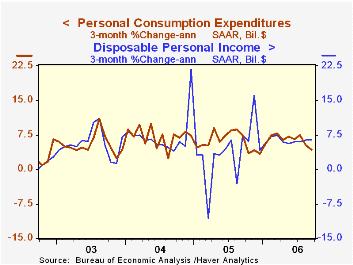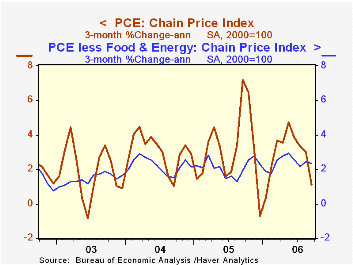 Global| Oct 30 2006
Global| Oct 30 2006U.S. Personal Income Firm, Core Price Increases Stable-to-Lower
by:Tom Moeller
|in:Economy in Brief
Summary
Personal income beat expectations last month and rose 0.5% after an upwardly revised 0.4% August increase. Despite these firm gains, the three month income rise at 5.5% (AR) is down from near 10% growth early this year. Disposable [...]

Personal income beat expectations last month and rose 0.5% after an upwardly revised 0.4% August increase. Despite these firm gains, the three month income rise at 5.5% (AR) is down from near 10% growth early this year.
Disposable personal income increased 0.5% (5.9% y/y) after an upwardly revised 0.5% August increase. In contrast to the slowdown in total income, the three month growth in take home pay has been stable at 6.4% (AR), helped by very recent weakness in personal taxes (+13.3% y/y).
Adjusted for recently lower prices, disposable personal income increased 0.8% (3.9% y/y) after two months of 0.2% gain. Real disposable income grew 3.7% (AR) last quarter after a 1.7% 2Q increase. Real disposable income per capita jumped 0.7% (3.0% y/y).
Personal consumption rose 0.1%. Expectations had been for a 0.3% increase. When adjusted for the 0.3% decline in prices, real consumer spending rose 0.4% after a 0.1% August decline. Unit vehicle sales in September recovered half of the prior month's decline with a 3.5% increase. Real PCE in 3Q grew 3.1% (AR), better than the 2.6% gain during 2Q.
The PCE chain price index fell 0.3% due to last month's 13.4% decline in retail gasoline prices. Gasoline prices in October are down another 11.9% m/m. Less food & energy prices rose an expected 0.2% but the August gain was revised higher to 0.3%. The three month change in core prices is flat-to-lower since March at 2.3% (AR), helped by falling durable and nondurable goods prices.
Wage & salary disbursements surged 0.5% (7.6% y/y) after the meager 0.2% August increase. Wages in the private service-producing industries surged 0.8% (8.4% y/y) but factory sector wages fell 0.1% (+6.7% y/y) for the second decline in the last three months.
Interest income rose 0.1% (8.7% y/y) for the third straight month while dividend income jumped another 1.1% (11.5% y/y).
The personal savings rate was a slightly less negative -0.2% last month and so far in 2006 has averaged -0.5%, the same as last year. Should the Decline in the Personal Saving Rate Be a Cause for Concern? from the Federal Reserve Bank of Kansas City is available here.
| Disposition of Personal Income | September | August | Y/Y | 2005 | 2004 | 2003 |
|---|---|---|---|---|---|---|
| Personal Income | 0.5% | 0.4% | 6.8% | 5.2% | 6.2% | 3.2% |
| Personal Consumption | 0.1% | 0.2% | 5.5% | 6.5% | 6.6% | 4.8% |
| Savings Rate | -0.2% | -0.5% | -0.5% (Sept. '05) | -0.4% | 2.0% | 2.1% |
| PCE Chain Price Index | -0.3% | 0.3% | 2.0% | 2.9% | 2.6% | 2.0% |
| Less food & energy | 0.2% | 0.3% | 2.4% | 2.1% | 2.0% | 1.4% |
Tom Moeller
AuthorMore in Author Profile »Prior to joining Haver Analytics in 2000, Mr. Moeller worked as the Economist at Chancellor Capital Management from 1985 to 1999. There, he developed comprehensive economic forecasts and interpreted economic data for equity and fixed income portfolio managers. Also at Chancellor, Mr. Moeller worked as an equity analyst and was responsible for researching and rating companies in the economically sensitive automobile and housing industries for investment in Chancellor’s equity portfolio. Prior to joining Chancellor, Mr. Moeller was an Economist at Citibank from 1979 to 1984. He also analyzed pricing behavior in the metals industry for the Council on Wage and Price Stability in Washington, D.C. In 1999, Mr. Moeller received the award for most accurate forecast from the Forecasters' Club of New York. From 1990 to 1992 he was President of the New York Association for Business Economists. Mr. Moeller earned an M.B.A. in Finance from Fordham University, where he graduated in 1987. He holds a Bachelor of Arts in Economics from George Washington University.
More Economy in Brief
 Global| Feb 05 2026
Global| Feb 05 2026Charts of the Week: Balanced Policy, Resilient Data and AI Narratives
by:Andrew Cates






